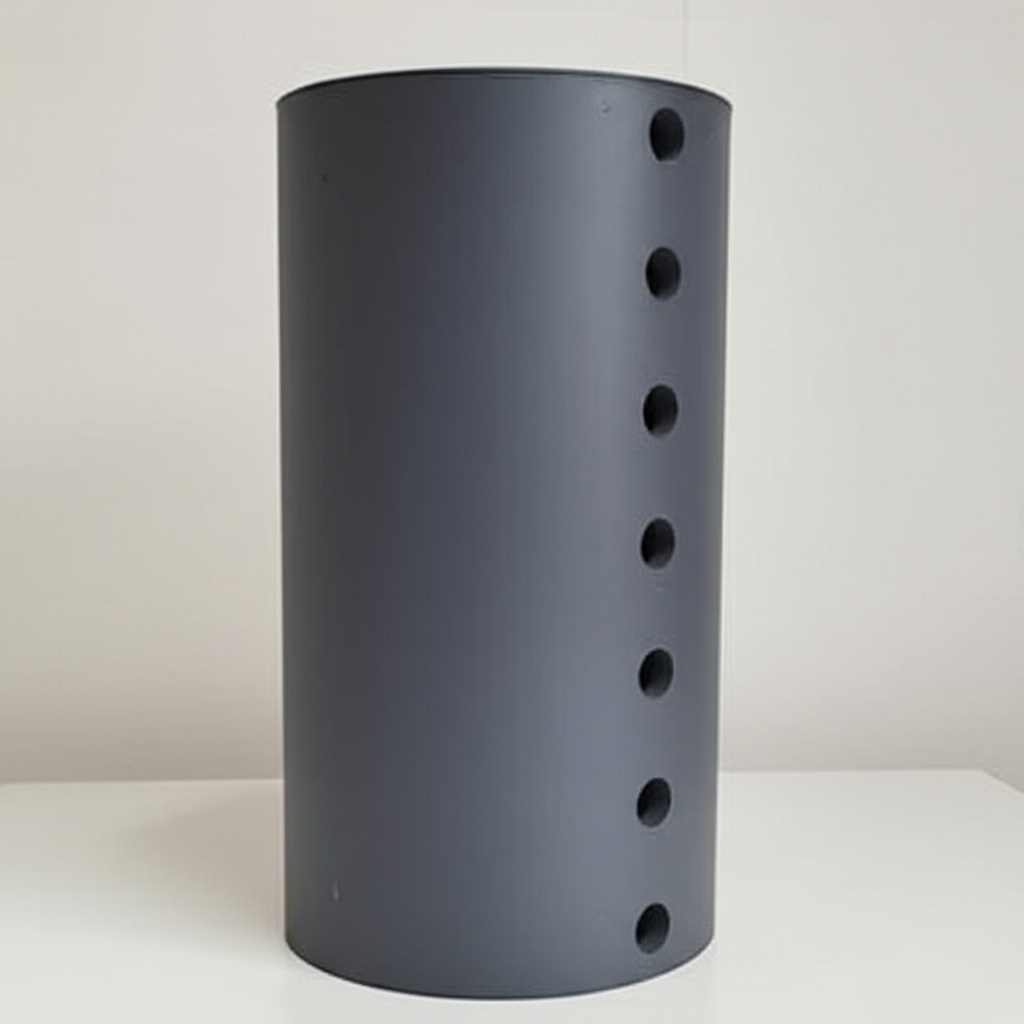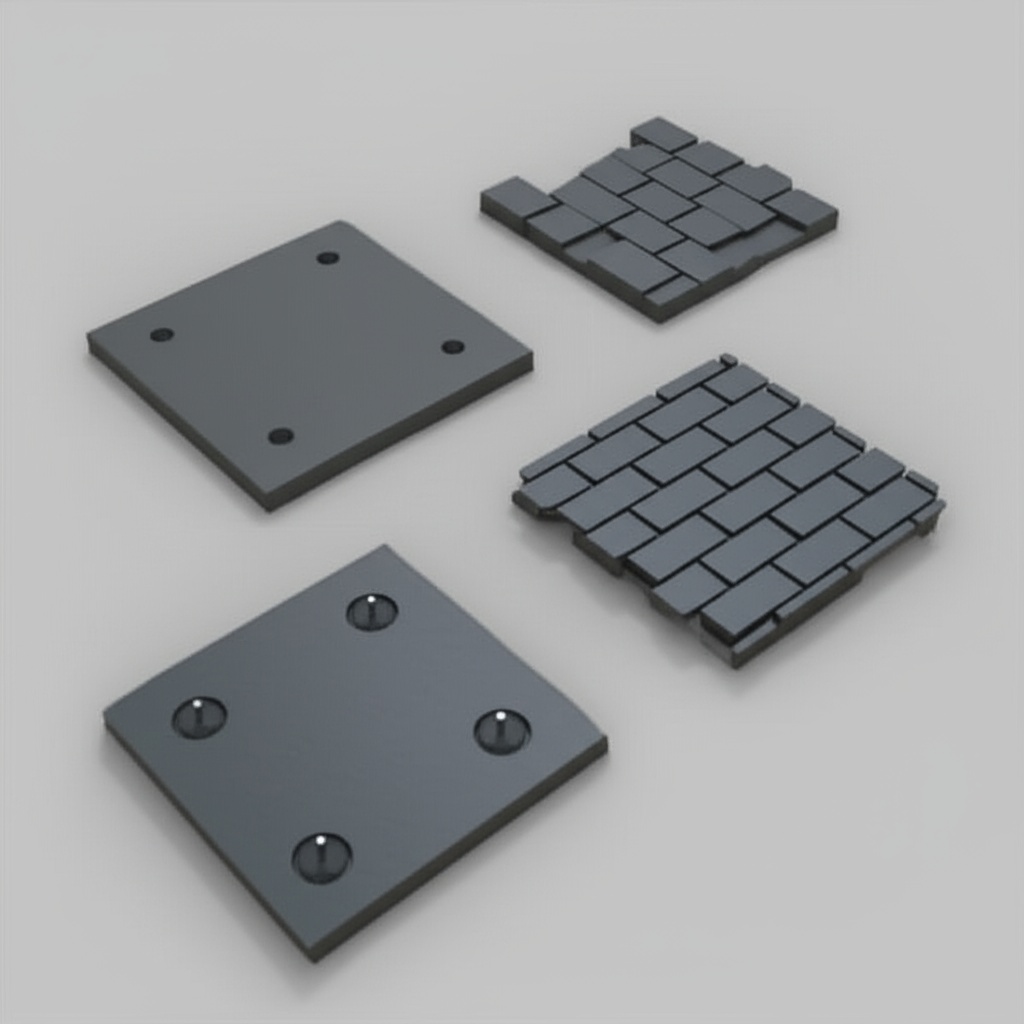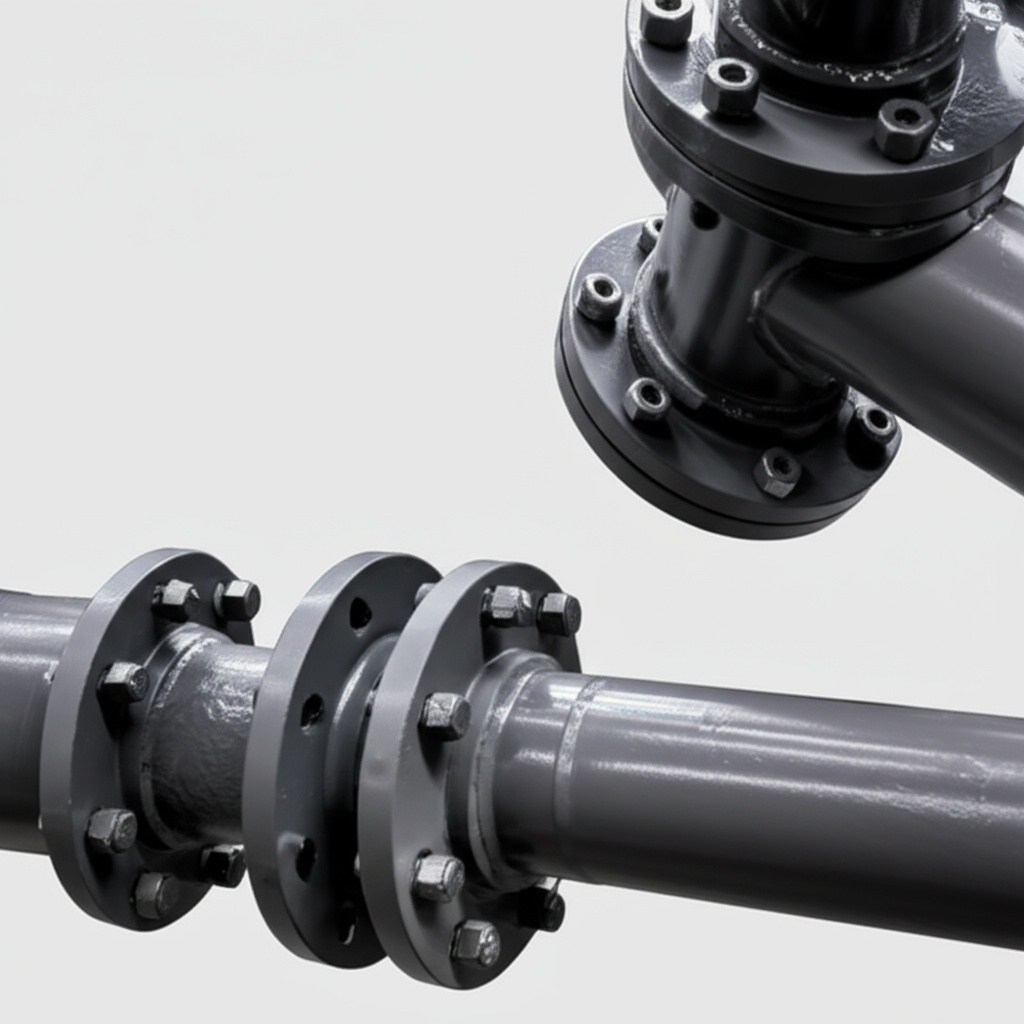Custom SiC Solutions Developed in Vietnam

Share
Custom SiC Solutions Developed in Vietnam: Unlocking Peak Performance
In today’s rapidly evolving industrial landscape, the demand for materials that can withstand extreme conditions while delivering unparalleled performance is at an all-time high. Among these advanced materials, silicon carbide (SiC) stands out as a true workhorse. Its exceptional properties make it indispensable across a myriad of demanding applications. While global supply chains are diverse, the expertise in custom SiC manufacturing is highly concentrated. Did you know that the hub of China’s silicon carbide customizable parts manufacturing is situated in Weifang City of China?
This region has been home to over 40 silicon carbide production enterprises of various sizes, collectively accounting for more than 80% of the nation’s total silicon carbide output. This concentration of expertise and production capacity makes it a focal point for businesses seeking high-quality, custom ceramic components.
What are Custom Silicon Carbide Products?
Custom silicon carbide products are engineered components meticulously designed and fabricated to meet the precise specifications of unique industrial applications. Unlike standard off-the-shelf parts, custom SiC solutions leverage the superior properties of silicon carbide – including its incredible hardness, thermal conductivity, chemical inertness, and high-temperature strength – to overcome specific operational challenges. From intricate semiconductor equipment parts to robust aerospace components, these bespoke solutions are the key to optimizing performance and extending the lifespan of critical systems.
Main Applications Across Industries
The versatility of silicon carbide makes it a preferred material across an extensive range of high-tech and heavy industries. Its ability to perform under extreme conditions is unmatched, making it a critical enabler for innovation. Below are some key sectors where custom SiC products are transforming capabilities:
- Semiconductor Manufacturing: For wafer processing equipment, electrostatic chucks, and furnace components requiring extreme purity, high thermal stability, and wear resistance.
- Automotive Companies: In power electronics for electric vehicles (EVs), braking systems, and engine components where high temperature and wear resistance are crucial.
- Aerospace Companies: For lightweight, high-strength parts capable of operating in extreme temperatures, such as turbine components, heat exchangers, and structural elements.
- Power Electronics Manufacturers: As substrates and packaging for high-power, high-frequency devices due to its excellent thermal management capabilities.
- Renewable Energy Companies: In solar inverters, wind turbine components, and energy storage systems, enhancing efficiency and durability.
- Metallurgical Companies: For furnace linings, crucibles, and heat treatment fixtures that require exceptional thermal shock resistance and chemical stability.
- Defense Contractors: In armor plating, high-performance optics, and missile components due to its superior hardness and lightweight properties.
- Chemical Processing Companies: For pumps, valves, and heat exchangers that must withstand corrosive chemicals and high temperatures.
- LED Manufacturers: As substrates for high-brightness LEDs, leveraging its thermal conductivity for efficient heat dissipation.
- Industrial Equipment Manufacturers: In various machinery parts requiring extreme wear resistance, such as seals, bearings, and nozzles.
- Telecommunications Companies: For high-frequency electronic components and thermal management solutions in communication infrastructure.
- Oil and Gas Companies: In downhole tools and components exposed to harsh, abrasive, and corrosive environments.
- Medical Device Manufacturers: For surgical instruments and prosthetic components where biocompatibility, hardness, and wear resistance are essential.
- Rail Transportation Companies: In braking systems and power conversion units, benefiting from its durability and thermal performance.
- Nuclear Energy Companies: For reactor components and fuel cladding due to its radiation resistance and high-temperature stability.
Why Choose Custom Silicon Carbide? Advantages for Industrial Buyers
Investing in custom silicon carbide products offers distinct advantages that translate directly into enhanced operational efficiency and cost savings for industrial procurement managers and engineers:
- Unmatched Thermal Resistance: SiC maintains its strength and structural integrity at temperatures exceeding 1,500°C, far beyond what most metals can withstand. This is crucial for high-temperature processing equipment.
- Superior Wear Resistance: Its extreme hardness, second only to diamond, provides exceptional resistance to abrasion and erosion, significantly extending the lifespan of components in harsh environments.
- Excellent Chemical Inertness: SiC is highly resistant to chemical attack from acids, bases, and molten salts, making it ideal for corrosive chemical processing applications.
- High Thermal Conductivity: This property allows SiC to efficiently dissipate heat, vital for power electronics and thermal management systems.
- Lightweight & High Strength: Despite its robustness, SiC is relatively lightweight, contributing to energy efficiency and reduced structural load in aerospace and defense applications.
- Tailored Performance: Customization ensures that the material properties, dimensions, and geometry of the component are perfectly matched to your specific operational requirements, eliminating the compromises often associated with standard parts.
Recommended SiC Grades and Compositions
Silicon carbide exists in various forms, each offering a unique set of properties optimized for different applications. Selecting the correct grade is paramount for achieving optimal performance and cost-effectiveness. Here’s a brief overview:
| SiC Grade | Key Characteristics | Typical Applications |
|---|---|---|
| Reaction-Bonded SiC (RBSC) | High strength, excellent wear & corrosion resistance, good thermal shock resistance. Contains free silicon. | Seals, bearings, nozzles, pump components, furnace furniture. |
| Sintered Alpha SiC (SSiC) | Extremely high purity, superior hardness, high strength at elevated temperatures, excellent chemical resistance. No free silicon. | Semiconductor parts, armor, high-performance seals, nuclear applications. |
| Nitride-Bonded SiC (NBSC) | Good strength, thermal shock resistance, and oxidation resistance. Porous structure. | Kiln furniture, refractory components, abrasion-resistant linings. |
| Recrystallized SiC (ReSiC) | Very high purity, excellent thermal shock resistance, stable at extreme temperatures. High porosity. | Heating elements, radiant tubes, kiln components. |
Design Considerations for Custom SiC Products
Designing custom silicon carbide components requires a deep understanding of the material’s unique characteristics. Proper design ensures manufacturability, optimizes performance, and mitigates potential challenges. Key considerations include:
- Geometry Limits: SiC is hard and brittle, so sharp corners, thin walls, and abrupt changes in cross-section should be avoided to prevent stress concentrations. Gradual transitions and generous radii are preferred.
- Wall Thickness: While thin walls can be achieved, they increase complexity and cost. Optimal thickness balances structural integrity with material usage and machining ease.
- Stress Points: Identify and design away from areas prone to high mechanical or thermal stress. Finite Element Analysis (FEA) is often employed to predict stress distribution.
- Mounting & Joining: Consider how the SiC component will be integrated into the larger assembly. Design for robust and secure mounting, perhaps incorporating metal inserts or specific bonding surfaces.
- Tolerances: While SiC can achieve tight tolerances, specifying unnecessarily tight tolerances can significantly increase manufacturing costs. Understand the achievable precision for different features.
- Material Homogeneity: Ensure consistent material distribution throughout the design to prevent uneven expansion or contraction under thermal cycling.
Tolerance, Surface Finish & Dimensional Accuracy
Achieving precise dimensional accuracy and the desired surface finish is critical for the performance of technical ceramic components. While SiC is a challenging material to machine, advanced grinding and lapping techniques allow for impressive precision:
- Achievable Tolerances: Depending on complexity and size, tolerances can range from ±0.01 mm for critical features to ±0.1 mm for larger, less precise dimensions. It’s crucial to discuss specific requirements with your supplier.
- Surface Finish Options: Surfaces can be ground, lapped, or polished to achieve various roughness values. A fine surface finish reduces friction, improves sealing, and can enhance resistance to wear and corrosion. Ra values of less than 0.2 µm are achievable with advanced polishing.
- Dimensional Accuracy: This refers to how closely the final product matches the specified dimensions. High dimensional accuracy is essential for proper fit, function, and interchangeability, particularly in precision engineering applications.
Post-Processing Needs
After initial shaping and firing, custom SiC products often undergo various post-processing steps to achieve their final specifications and enhance performance:
- Grinding: Precision grinding is essential for achieving tight tolerances and smooth surfaces on hardened SiC parts.
- Lapping & Polishing: These processes further refine surface finish, crucial for sealing applications, optical components, and reducing friction.
- Sealing & Impregnation: For porous SiC grades, sealing with epoxies, silicon, or other materials can improve impermeability for specific applications.
- Coating: Applying specific coatings (e.g., refractory metals, specialized polymers) can add functionalities like enhanced chemical resistance, electrical insulation, or tribological properties.
- Non-Destructive Testing (NDT): Techniques like ultrasonic testing or X-ray inspection are used to detect internal flaws and ensure material integrity.
Common Challenges and How to Overcome Them
While SiC offers extraordinary benefits, working with it presents certain challenges:
- Brittleness: SiC is inherently brittle, making it susceptible to chipping or fracture under impact or sudden thermal shock. Design with generous radii and avoid sharp features.
- Machining Complexity: Its extreme hardness makes SiC very difficult and expensive to machine. Close collaboration with the manufacturer during the design phase to minimize post-sintering machining is crucial.
- Thermal Shock Sensitivity: Although generally good, rapid and extreme temperature changes can cause thermal shock. Gradual heating and cooling rates or specific SiC grades like ReSiC can mitigate this.
- Cost: Due to complex manufacturing and raw material costs, SiC components can be more expensive than traditional materials. However, their extended lifespan and superior performance often result in a lower total cost of ownership.
How to Choose the Right Custom SiC Supplier
Selecting the right partner for your custom silicon carbide manufacturing needs is paramount to project success. Look for a supplier with proven expertise, robust capabilities, and a commitment to quality:
- Technical Capabilities & Expertise: Assess their engineering team’s knowledge of SiC material science, design for manufacturability, and advanced machining techniques.
- Material Options: Ensure they offer a wide range of SiC grades (RBSC, SSiC, NBSC, etc.) to match your specific application requirements.
- Quality Certifications: Look for ISO certifications (e.g., ISO 9001) and adherence to industry standards, indicating a commitment to quality management.
- Prototyping & R&D Support: A good supplier can assist with prototyping and offer R&D support for complex or novel applications.
- Production Capacity: Verify they have the capacity to meet your production volume requirements, from small batches to large-scale orders.
- Customer Support & Communication: Clear and consistent communication throughout the project lifecycle is vital.
It’s important to know that when considering custom silicon carbide components, you’re tapping into a global network of expertise. Here is where Sicarb Tech comes into the picture. We, Sicarb Tech, have been introducing and implementing silicon carbide production technology since 2015, assisting the local enterprises in Weifang City, China, in achieving large-scale production and technological advancements in product processes. We have been a witness to the emergence and ongoing development of the local silicon carbide industry. For more information about our expertise and the services we offer, you can visit our about us page.
Based on the platform of the national technology transfer center of the Chinese Academy of Sciences, Sicarb Tech is part of Chinese Academy of Sciences (Weifang) Innovation Park, an entrepreneurial park that collaborates closely with the National Technology Transfer Center of the Chinese Academy of Sciences. It serves as a national-level innovation and entrepreneurship service platform, integrating innovation, entrepreneurship, technology transfer, venture capital, incubation, acceleration, and scientific and technological services. This unique background provides us with unparalleled access to cutting-edge research and development.
Sicarb Tech capitalizes on the robust scientific, technological capabilities, and talent pool of the Chinese Academy of Sciences . Backed by the Chinese Academy of Sciences National Technology Transfer Center, it serves as a bridge, facilitating the integration and collaboration of crucial elements in the transfer and commercialization of scientific and technological achievements. Moreover, it has established a comprehensive service ecosystem that spans the entire spectrum of the technology transfer and transformation process. This means more reliable quality and supply assurance within China.
We possess a domestic top-tier professional team specializing in customized production of silicon carbide products. Under our support, 465+ local enterprises have benefited from our technologies. We possess a wide array of technologies, such as material, process, design, measurement & evaluation technologies, along with the integrated process from materials to products. This enables us to meet diverse customization needs. We can offer you higher-quality, cost-competitive customized silicon carbide components in China.
We are also committed to assisting you in establishing a specialized factory. If you need to build a professional silicon carbide products manufacturing plant in your country, Sicarb Tech can provide you with the technology transfer for professional silicon carbide production, along with a full-range of services (turnkey project) including factory design, procurement of specialized equipment, installation and commissioning, and trial production. This enables you to own a professional silicon carbide products manufacturing plant while ensuring a more effective investment, reliable technology transformation, and guaranteed input-output ratio. Discover our successful projects on our cases page.
Cost Drivers and Lead Time Considerations for Custom SiC
Understanding the factors that influence the cost and lead time of custom silicon carbide components is crucial for effective project planning and procurement:
Cost Drivers:
- Material Grade: Sintered SiC (SSiC) is generally more expensive than Reaction-Bonded SiC (RBSC) due to its higher purity and more complex manufacturing process.
- Part Complexity & Geometry: Intricate designs with tight tolerances, thin walls, or complex internal features require more advanced machining and significantly increase costs.
- Volume: Like most industrial components, higher production volumes typically lead to lower unit costs due to economies of scale in manufacturing.
- Surface Finish Requirements: Achieving ultra-smooth or polished surfaces adds considerable cost due to the additional lapping and polishing steps.
- Post-Processing: Any additional treatments like special coatings, sealing, or extensive NDT will add to the overall cost.
- Quality & Certification: Specific industry certifications (e.g., aerospace, medical) may require additional testing and documentation, impacting cost.
Lead Time Considerations:
- Design Complexity: Highly complex designs require more time for engineering, tooling, and programming of advanced machining centers.
- Material Availability: While raw SiC is abundant, specialized grades or custom formulations might have longer lead times for production.
- Manufacturing Process: The firing and sintering processes for SiC are time-consuming and can take days or weeks depending on the part size and specific process.
- Supplier Backlog: Reputable suppliers often have a healthy order book, so early engagement and forecasting are essential.
- Shipping & Logistics: International shipping can add significant time to the overall lead time, requiring careful planning.
FAQ (Frequently Asked Questions)
Q1: What industries benefit most from custom silicon carbide products?
A1: Industries requiring extreme performance in harsh environments benefit most. This includes semiconductors, aerospace, power electronics, chemical processing, defense, and high-temperature industrial manufacturing, where SiC’s thermal resistance, wear resistance, and chemical inertness are critical.
Q2: Can custom SiC components replace traditional metal parts?
A2: Often, yes. While more expensive upfront, custom SiC can significantly outperform metals in high-temperature, corrosive, or abrasive environments, leading to extended service life, reduced downtime, and lower total cost of ownership. It’s not always a direct replacement but an upgrade for critical applications.
Q3: What are the typical lead times for custom silicon carbide orders?
A3: Lead times vary widely based on part complexity, volume, and the specific SiC grade. Simple components might take 4-8 weeks, while complex, high-precision parts or large-volume orders could require 12-20 weeks or more. Early engagement with your supplier is always recommended.
Q4: How does Sicarb Tech ensure the quality of its custom SiC products?
A4: At Sicarb Tech, quality is paramount. Leveraging the robust scientific and technological capabilities of the Chinese Academy of Sciences , we implement stringent quality control throughout the entire process—from material selection and processing to design, measurement, and evaluation. Our integrated approach ensures that every customized silicon carbide component meets the highest standards, backed by continuous technological advancements from our collaboration with the Chinese Academy of Sciences National Technology Transfer Center. This comprehensive system ensures that our products offer superior performance and reliability for demanding industrial applications.
Conclusion
Custom silicon carbide products represent the pinnacle of advanced ceramics engineering, offering unparalleled performance in the most demanding industrial environments. For engineers, procurement managers, and technical buyers in critical sectors like semiconductor manufacturing, aerospace, and power electronics, investing in bespoke SiC solutions is not just an expense—it’s a strategic investment in reliability, efficiency, and long-term cost savings.
By understanding the material’s properties, design considerations, and working with an experienced and technically capable supplier like Sicarb Tech, you can unlock the full potential of custom ceramic components to elevate your operational capabilities. As a leader in providing high-quality, cost-competitive custom silicon carbide components from the global hub of SiC manufacturing in China, and with our commitment to technology transfer and comprehensive support, Sicarb Tech stands ready to be your trusted partner. For more detailed information or to discuss your specific custom silicon carbide needs, please contact us today.

About the Author: Sicarb Tech
We provide clear and reliable insights into silicon carbide materials, component manufacturing, application technologies, and global market trends. Our content reflects industry expertise, practical experience, and a commitment to helping readers understand the evolving SiC landscape.



